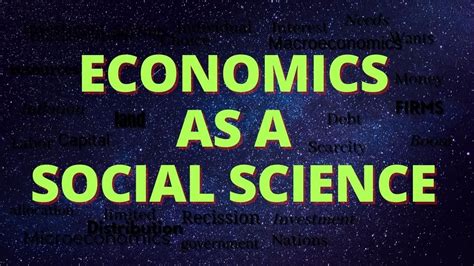Economics is the study of how societies allocate their scarce resources. It is a social science because it deals with human behavior and social institutions. Economics is not an exact science like physics or chemistry, but it uses scientific methods to analyze economic data and develop economic theories.

The Scope of Economics
Economics is a broad field of study that encompasses many different areas, including:
- Microeconomics is the study of individual markets and the behavior of individual consumers and firms.
- Macroeconomics is the study of the economy as a whole, including topics such as inflation, unemployment, and economic growth.
- International economics is the study of the international economy, including topics such as trade, foreign exchange, and economic development.
- Public economics is the study of the role of government in the economy, including topics such as taxation, public spending, and social welfare.
The Importance of Economics
Economics is an important social science because it helps us to understand how the economy works. This understanding is essential for making informed decisions about economic policy. For example, economics can help us to understand the impact of taxes on economic growth, the effects of trade on employment, and the causes of inflation.
The Critics of Economics
Some people argue that economics is not a true social science because it is not based on scientific methods. They point out that economic theories are often based on assumptions that are not always valid, and that economic models often fail to predict economic outcomes accurately.
However, most economists believe that economics is a valid social science. They argue that economics uses scientific methods to analyze economic data and develop economic theories, and that economics is a useful tool for understanding how the economy works.
The Future of Economics
Economics is a constantly evolving field of study. New economic theories and models are being developed all the time. As the economy changes, so too does the study of economics.
The future of economics is bright. Economics is a vital social science that can help us to understand the economy and make informed decisions about economic policy.
Keywords
- Economics
- Social science
- Microeconomics
- Macroeconomics
- International economics
- Public economics
Tables
Table 1: The Nobel Prize in Economics
| Year | Laureate | Nationality | Affiliation |
|---|---|---|---|
| 1969 | Ragnar Frisch | Norwegian | University of Oslo |
| 1969 | Jan Tinbergen | Dutch | Netherlands School of Economics |
| 1970 | Paul Samuelson | American | Massachusetts Institute of Technology |
| 1971 | Simon Kuznets | Russian-American | University of Pennsylvania |
| 1972 | John Hicks | British | University of Oxford |
| 1972 | Kenneth Arrow | American | Stanford University |
| 1973 | Wassily Leontief | Russian-American | Harvard University |
| 1974 | Gunnar Myrdal | Swedish | University of Stockholm |
| 1974 | Friedrich Hayek | Austrian-British | University of Chicago |
| 1975 | Leonid Kantorovich | Russian | Academy of Sciences of the USSR |
| 1975 | Tjalling Koopmans | Dutch-American | Yale University |
Table 2: The World’s Largest Economies
| Rank | Country | GDP (nominal, 2022) |
|---|---|---|
| 1 | United States | $26.49 trillion |
| 2 | China | $18.32 trillion |
| 3 | Japan | $5.06 trillion |
| 4 | Germany | $4.22 trillion |
| 5 | United Kingdom | $3.19 trillion |
| 6 | India | $3.17 trillion |
| 7 | France | $2.94 trillion |
| 8 | Canada | $2.26 trillion |
| 9 | Russia | $2.14 trillion |
| 10 | Australia | $1.73 trillion |
Table 3: The World’s Largest Banks
| Rank | Bank | Assets (USD, 2022) |
|---|---|---|
| 1 | Industrial and Commercial Bank of China | $5.33 trillion |
| 2 | China Construction Bank | $4.89 trillion |
| 3 | Bank of America | $4.13 trillion |
| 4 | Agricultural Bank of China | $4.06 trillion |
| 5 | JPMorgan Chase | $4.05 trillion |
| 6 | Bank of China | $3.99 trillion |
| 7 | Wells Fargo | $3.66 trillion |
| 8 | Mitsubishi UFJ Financial Group | $3.64 trillion |
| 9 | Citigroup | $3.59 trillion |
| 10 | HSBC | $3.31 trillion |
Table 4: The World’s Largest Stock Exchanges
| Rank | Stock Exchange | Market Capitalization (USD, 2022) |
|---|---|---|
| 1 | New York Stock Exchange | $25.8 trillion |
| 2 | Nasdaq | $21.7 trillion |
| 3 | Shanghai Stock Exchange | $10.3 trillion |
| 4 | Shenzhen Stock Exchange | $8.5 trillion |
| 5 | Tokyo Stock Exchange | $5.7 trillion |
| 6 | London Stock Exchange | $5.6 trillion |
| 7 | Hong Kong Stock Exchange | $5.5 trillion |
| 8 | Euronext | $4.7 trillion |
| 9 | Toronto Stock Exchange | $3.1 trillion |
| 10 | Deutsche Börse | $3.0 trillion |
